|
|
|
Sort Order |
|
|
|
Items / Page
|
|
|
|
|
|
|
| Srl | Item |
| 1 |
ID:
092136
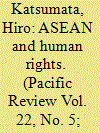

|
|
|
|
|
| Publication |
2009.
|
| Summary/Abstract |
Observers of Southeast Asian affairs commonly assume that the members of the Association of Southeast Asian Nations (ASEAN) are reluctant to pursue liberal agendas, and that their main concern is to resist pressure from Western powers to improve their human rights practice. This article, however, argues that such a conventional view is too simplistic. The Southeast Asian countries have voluntarily been pursuing liberal agendas, and their main concern here is to be identified as 'Western' countries - advanced countries with legitimate international status. They have 'mimetically' been adopting the norm of human rights which is championed by the advanced industrialized democracies, with the intention of securing ASEAN's identity as a legitimate institution in the community of modern states. Ultimately, they have been pursuing liberal agendas, for the same reason as cash-strapped developing countries have luxurious national airlines and newly-independent countries institute national flags. Yet it should be noted that the progress of ASEAN's liberal reform has been modest. A conventional strategy for facilitating this reform would be to put more pressure on the members of ASEAN; however, the usefulness of such a strategy is diminishing. The development of an East Asian community, the core component of which is the ASEAN-China concord, makes it difficult for the Western powers to exercise influence over the Southeast Asian countries. Hence, as an alternative strategy, this article proposes that ASEAN's external partners should 'globalize' the issue of its liberal reform, by openly assessing its human rights record in global settings, with the aim of boosting the concern of its members for ASEAN's international standing.
|
|
|
|
|
|
|
|
|
|
|
|
|
|
|
|
| 2 |
ID:
126472
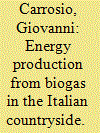

|
|
|
|
|
| Publication |
2013.
|
| Summary/Abstract |
In recent years, Italy has witnessed a proliferation of agricultural biogas plants. This article argues that institutional factors have played an important role in their diffusion. It describes the state and evolution of agricultural biogas in Italy, and then investigates the extent to which institutional pressures have been influential in shaping organizational models of biogas production. It finds that the dominance of one particular organizational model is the result of an isomorphic process in which a monopolistic market, legal structures, and subsidies play a role. The prevalence of this organizational model, however, does not lead to the effective use of biogas production, and furthermore it results in low environmental efficiency. For a more sustainable development of bioenergy, Italian policy-makers should reform the existing institutional framework by reorganizing subsidies, liberalizing the management of gas grids, and involving farmers in local projects.
|
|
|
|
|
|
|
|
|
|
|
|
|
|
|
|
| 3 |
ID:
166613
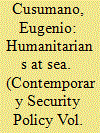

|
|
|
|
|
| Summary/Abstract |
Between 2014 and 2017, no less than 10 different non-governmental organizations (NGOs) conducted maritime Search and Rescue (SAR) operations off the coast of Libya. By rescuing over 100,000 migrants in three years, these NGOs became the largest provider of SAR in the Mediterranean. The theory of institutionalism suggests that organizations conducting similar activities are likely to converge in a process of mimetic isomorphism, deliberately imitating one another to increase their effectiveness and cope with uncertainty. These 10 SAR NGOs, however, developed two different rescue models: While some rescued migrants and disembarked them in Italian ports, others only simply assisted those in distress until the arrival of another ship transporting them to land. They also cooperated with Italian and European authorities to different degrees. Why did SAR NGOs imitated many elements of existing non-governmental rescue models, but discarded some others? This article argues that differences in material capabilities and organizational role conceptions are crucial to explain why newer SAR NGOs have imitated most but not all of their predecessors’ policies, engaging in a process of “selective emulation.”
|
|
|
|
|
|
|
|
|
|
|
|
|
|
|
|
| 4 |
ID:
131888
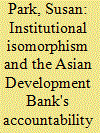

|
|
|
|
|
| Publication |
2014.
|
| Summary/Abstract |
In the 1990s Multilateral Development Banks created accountability mechanisms (AMs) that allowed people affected by development projects redress. Currently undertheorized, this paper examines how and why the Asian Development Bank (ADB) created an AM, and whether the AM serves its purpose to hold the ADB to account and to provide 'fair hearing of the views of the affected group'. This article argues that the ADB created a new AM because of institutional isomorphism, borrowing the idea of the AM from the World Bank as a result of coercive and mimetic isomorphic processes. Further, that the ADB introduced a mechanism ill-suited to the pre-existing (old) organizational culture of the ADB, which is based on consensus and hierarchical rule-following in the context of ADB operations to further economic growth while upholding state sovereignty. Despite its restructure and recent review, the mechanism's weakness was revealed through a stand-off between China and the AM over an investigation begun in 2009 (creating something 'blue'). The paper concludes that the AM's ability to serve its purpose will remain hampered as long as ADB maintains consensus around economic growth and state sovereignty over providing recourse to affected people.
|
|
|
|
|
|
|
|
|
|
|
|
|
|
|
|
| 5 |
ID:
141103
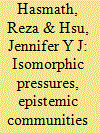

|
|
|
|
|
| Summary/Abstract |
This article suggests that the lack of meaningful collaboration between the state and NGOs in China is not solely a result of the state seeking to restrict the development of the sector, or the fear of a potential opposing actor to the state; instead, interviews with NGOs in Beijing and Shanghai suggest that a lack of meaningful engagement between the state and NGOs can be partially attributed to isomorphic pressures within state–NGO relations, and insufficient epistemic awareness of NGO activities on the part of the state. In fact, the evidence suggests that once epistemic awareness is achieved by the state, it will have a stronger desire to interact with NGOs – with the caveat that the state will seek to utilize the material power of NGOs, rather than their symbolic, interpretive or geographical capital.
|
|
|
|
|
|
|
|
|
|
|
|
|
|
|
|
| 6 |
ID:
184087
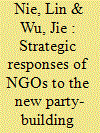

|
|
|
|
|
| Summary/Abstract |
Over the last decade, the Chinese Communist Party (CCP) has sought to assimilate the third sector – non-governmental organizations (NGOs) – through its party-building campaign. This article examines NGOs’ strategies in response to this campaign, based on in-depth interviews with 64 NGOs and local cadres. We find that NGOs have developed three main strategies to respond to the CCP’s attempts to penetrate their organizations. First, NGOs embedded in the party-state system and those affiliated with private enterprises tend to acquiesce to party building out of habit and for compliance reasons, respectively. Second, those with multiple stakeholders generally compromise in the party-building process, acting as passive compliers if they depend more on non-state resources, or active players if they rely more on state resources. Third, civic NGOs that advocate causes inconsistent with the ruling regime might avoid party building as a resistant strategy, by either disguising their nonconformity or escaping from the control of the ruling regime entirely. NGOs’ strategic responses are contingent on their negotiating power, which results from their resource dependence and the party’s enforcement dilemmas. This article contributes to our understanding of the recent party-building campaign from an institutional perspective, and enriches our knowledge about relations between the party and the third sector.
|
|
|
|
|
|
|
|
|
|
|
|
|
|
|
|
| 7 |
ID:
154462
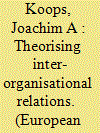

|
|
|
|
|
| Summary/Abstract |
This article explores the historical evolution of research on the “European Union (EU)–North Atlantic Treaty Organisation (NATO) relationship” since the 1950s and examines the numerous ways in which it has served as an important case study for applying and developing theory-guided and conceptual research on inter-organisational relations (IOR) in International Relations. After a dearth of policy-oriented research during the 1990s and early 2000s, a wide range of scholars have contributed to a “conceptual turn” in the study of EU–NATO during the last decade. This development, as this article will argue, not only signifies a stronger interest by scholars to understand the complex relationship between both organisations with the help of more theory-driven research, but also highlights that the EU–NATO relationship has become a “catalytic case study” in terms of inspiring conceptual experimentation and advancing efforts to theorise IOR more generally. The article provides for the first time a systematic stock-taking and analysis of the richness of concepts and theoretical debates related to EU–NATO relations research and offers scholars wider insights into the most promising approaches and analytical tools for understanding and theorising EU–NATO relations.
|
|
|
|
|
|
|
|
|
|
|
|
|
|
|
|
|
|
|
|
|